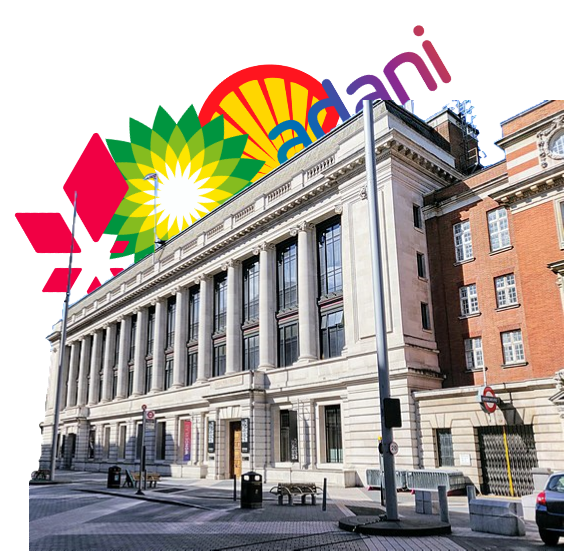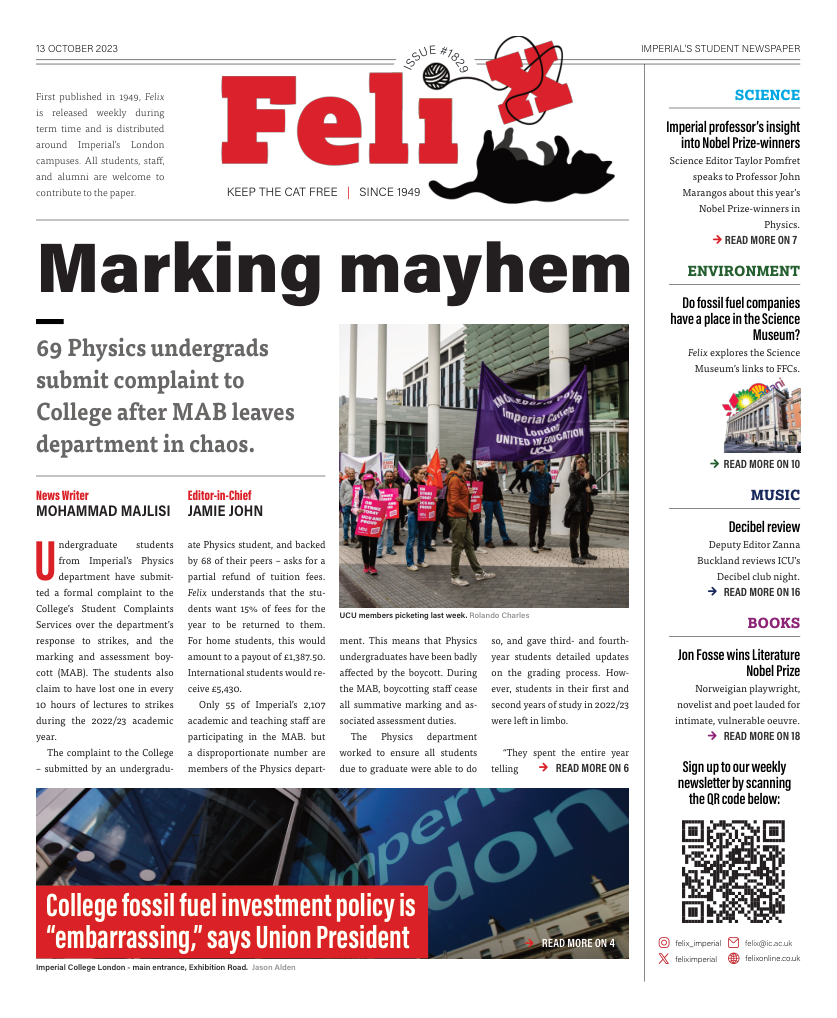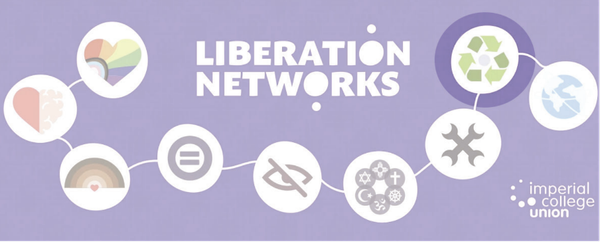Do fossil fuel companies have a place in the Science Museum?
Felix investigates the presence of fossil fuel companies at the Science Museum.

Pressure is growing for the Science Museum to cut ties with the fossil fuel companies that currently sponsor its exhibitions. BP sponsors the museum’s educational wing and Shell, Equinor, and the Adani Group have sponsored its exhibitions. Campaigners believe it is hypocritical for exhibitions about science and climate change to be funded by these organisations, which have historically spread misinformed science and are contributing disproportionately to the climate crisis.
Why are the Science Museum’s fossil fuel partnerships controversial?
BP is a founding partner of the Science Museum Group (SMG)’s STEM training academy, which gives training and resources to those working in science communication and education. It also supported the Enterprising Science initiative – which encouraged young people to engage more with science – alongside the SMG.
“bp has been investing in education for more than 50 years working to address the UK STEM skills gap and contributing to every stage of education”, said David Nicholas, vice-president of media relations for BP. “We are proud to have partnered with the Science Museum Group, King’s College London and UCL Institute of Education on the pioneering ‘Enterprising Science’ research project in 2013, the success of which led to the creation of the Science Museum Academy of Science Engagement in 2018.”
BP’s involvement with science outreach goes further back than this. In the mid-1990s, its What makes weather documentary explained the consequences of burning fossil fuels to schoolchildren. Despite knowing these consequences, BP was until 1996 a member of the Global Climate Coalition – a lobbying group which tried to discredit climate science and campaigned against policies to reduce greenhouse gas emissions. BP continues to be accused of delaying climate action today. Critics have, for example, pointed to the oil giant’s recent scaling back of its expected carbon emission reduction from 40% by 2030 to 25%.
“bp is transforming into an integrated energy company”, explained David, “and while we are still mostly in oil and gas today, we are increasing our global investment into lower carbon and other transition businesses – this rose from around 3% of our total investment in 2019 to 30% in 2022. We aim for this proportion to reach 50% by 2030.”
Shell sponsored the Our Future Planet exhibition about carbon capture and storage, which ran in the Science Museum from May 2021 to September 2022. Channel 4 News reported that the contract included a ‘gagging clause’, meaning the museum could not say anything that damaged Shell’s reputation. The Science Museum’s Atmosphere exhibition about climate change, which closed in March 2022 after 12 years, was also sponsored by Shell. According to a 2015 article in The Guardian, Shell representatives tried to influence the content of this exhibition.
“We fully respected the museum’s independence,” said Paul Connolly, Shell’s media spokesperson. “That’s why its exhibition on carbon capture mattered and why we supported it. Debate and discussion – among anyone who saw it – were essential. There was no question of us trying to restrict this.” A Science Museum spokesperson said, “At all times the Science Museum retains editorial control of the content within our exhibitions and galleries, and this is asserted clearly and unambiguously in all contracts we sign.”
In the 1990s, Shell produced a documentary called Climate of Concern warning the public about the effects of climate change – while being a founding member of the Global Climate Coalition. “The Shell Group did not have unique knowledge about climate change,” said Connolly. “The issue of climate change and how to tackle it has long been part of public discussion and scientific research for many decades. It has been widely discussed and debated ... Our position on the issue has been publicly documented for more than 30 years, including publications such as our Annual Report and Sustainability Report.”
Activists claim Shell continues to delay climate action, even after the Coalition’s dissolution. . Earlier this year, it U-turned on plans to reduce annual oil production by 1 to 2% per year, instead announcing that production would remain stable until 2030. “It remains our view that global energy demand will continue to grow and be met by different types of energy – including oil and gas,” said Connolly.
Equinor currently sponsor the Science Museum’s Wonderland gallery, consisting of interactive science exhibits. According to The Guardian, this contract also included a ‘gagging clause’. The Norwegian oil company has recently come under fire over the new Rosebank oil field in the North Sea, which was recently approved by British regulators. “We are still in contract with the museum and title sponsor of Wonderlab: The Equinor Gallery,” said Alice Baxter, media spokesperson from Equinor.
However, most of the recent outcry about the Science Museum has been about the Adani Group. A renewable company within the Indian conglomerate – whose diverse operations include coal mining and thermal power plants – is sponsoring a Science Museum exhibition. From early 2024, Energy Revolution: The Adani Green Energy Gallery will display the latest climate science and technological solutions to combatting the climate crisis. Science education is not new to the Adani Group – its community engagement wing is educating thousands of students in India. However, activists believe Adani's educational initiatives do not excuse the environmental and ethical violations other companies in the Adani Group have conducted. For example, the Group operates coal mines in India, Indonesia and Australia – some of which are on indigenous land. Even Adani Green, a renewable energy company and title sponsor of the Science Museum exhibition, has not escaped without scrutiny. Their solar power plants in India have been accused of displacing farmland and using too much freshwater. Many of the environmental and human rights abuses Adani Group have carried out were mentioned in the Science Museum’s own due diligence report in 2020 – but this report seems to have been ignored or circumvented by claiming to partner only with Adani Green. However, a report by the research firm Hindenburg challenges the independence of Adani Green from the Group’s coal mines. The Adani Group did not respond to our request for comment.

How has the Science Museum replied?
The SMG has signed up to the Science-Based Target Initiative, which tracks companies which are committed to the goals of the Paris Agreement. Their direct carbon emissions have fallen by 69% since 2011/12, and they aim to be net zero by 2033. As of 2022, the SMG also asks for partners to be on track to meet Paris Agreement climate goals by the end of March 2024, which they assess using the Transition Pathway Initiative. This initiative has given the decarbonisation pathways of BP, Shell and Equinor the best possible classification – despite itself reporting in 2020 that no fossil fuel companies are on track to meet these goals.
“External funding has been vital to the transformation of our five museums”, said a Science Museum Group spokesperson, “creating inspiring, free spaces where millions of visitors can immerse themselves in authentic stories about science, engineering, mathematics and more … We continue to urge companies in carbon intensive sectors to show more leadership in speeding up the transition to low-carbon energy sources.”
What resistance have the partnerships faced?
Over the last four years, activists have protested at the Science Museum over its fossil fuel partnerships. For example, UK Student Climate Network spent the night in the Science Museum in October 2021, and Extinction Rebellion put up a banner inside the museum during the Great Exhibition Road Festival earlier this year. Last week, 100 people from Climate Choirs walked through the Science Museum, singing in protest of fossil fuel sponsorships. “The Science Museum is helping these companies to greenwash their reputations while destroying its own,” said Professor Jeff Waage OBE, Imperial College alumnus and member of the activist coalition Fossil Free Science Museum. “As the Museum is a cherished national educational institution, this deceit is directed primarily at young people who will inherit the climate change emergency.” These demonstrations have been supported by resignations of two of the Science Museum Group’s trustees and vocal condemnation from former UK Chief Scientific Advisor Sir David King. Speakers have also pulled out of the Science Museum’s ‘Climate Talks’ series over these partnerships.
In 2021, academics and science communicators signed an open letter pledging not to work with the Science Museum until the controversial sponsorships are dropped. Dr Dave Clements, Reader in Astrophysics at Imperial and one of the signatories of the open letter, said he was “very disappointed” in the Science Museum. “It's clear that ... the current management and board of directors are more worried about money than, frankly, the science - and they're quite willing to let organisations like Adani be able to have some commercially motivated input into exhibitions,” Dr Clements said. “Despite being asked to contribute to [a recent Science Museum exhibition], I could not because they have not changed their policy on sponsorship. I would advise all my colleagues to withdraw their support from similar events and tell the Science Museum why.”
The Science Museum is one of the few remaining British arts institutions that still partners with the fossil fuel industry. The British Museum, Royal Opera House, and National Portrait Gallery all ended their partnerships with BP earlier this year. In 2019, Royal Shakespeare Company terminated BP’s initiative to provide subsidised tickets to young people wanting to see their plays.








